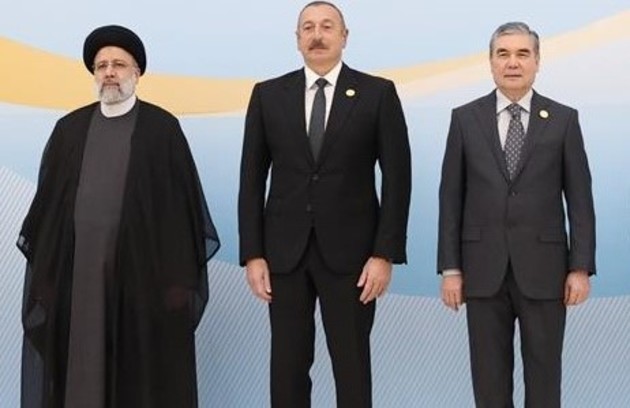Iran has entered a gas swap agreement with Turkmenistan and Azerbaijan on Sunday on the sidelines of the 15th meeting of the Economic Cooperation Organization. “According to the agreement, 1.5 to 2 billion cubic meters of gas will be imported to Iran annually from Turkmenistan (Sarakhs) and will be sent to Azerbaijan (Astara) through the Iran Transmission Line Network,” Tasnim News reported. Iran’s goal here is to position itself as a key gas supplier and deepen ties with Azerbaijan and Central Asia, The Jerusalem Post writes.
“The agreement was signed on November 28 in the Turkmen capital, Ashgabat, on the sidelines of a regional economic summit. Under the swap deal – which boosts an existing agreement – Iran will receive gas from Turkmenistan and deliver the same amount to Azerbaijan, Iranian Oil Minister Javad Owji told Iranian state media.” This has ramifications for the planned TAPI pipeline that links Turkmenistan, Afghanistan, Pakistan and India as well as the North Caucasus Transcaucasia Pipeline.
Iran's gas relations with Turkmenistan had been suspended since December 2016, but with the conclusion of this agreement, a step forward was taken in the energy relations between the two countries. This means that “an important political message lies at the heart of this agreement and can fulfill Iran's plan to become a gas hub in the region.”
This message is important because it could facilitate Iran's next steps in expanding trade with Turkmenistan, especially in the field of gas. Iran is concerned about the TAPI line and other attempts via the Trans-Caspian pipeline (TCP) that would have removed Iran from being a gas hub. “According to experts, concluding a gas swap agreement with Turkmenistan is the first step in implementing a master plan in the Ministry of Oil of the 13th government, the continuation of which will lead to the mating of these two rival pipelines of Iran's regional gas market.” Maps produced by Iranian media show how Iran can now be part of various gas pipelines and transit routes that would take a southern approach through Iran. “According to the pipeline, the Turkmen gas network connects the Caspian Sea to Azerbaijan and is designed to transfer the vast Central Asian gas resources to European energy markets through the Southern Gas Corridor.”
The Trans-Caspian Pipeline (TCP) between Turkmenistan and Azerbaijan will be connected from the Caspian Sea to the SCP pipeline inside Azerbaijan, the report says. Then, at the end of the SCP pipeline, a connection will be added to the TANAP pipeline in Turkey. This would give Iran more influence over Turkey and Europe through the Trans Adriatic Pipeline (TAP), including Greece, Albania and Italy.
Currently, the only missing link in the Southern Gas Corridor is the Trans-Caspian Pipeline (TCP), which has been stalled for years due to legal disputes in the Caspian Sea over investment and economic justification. As a result, Turkmenistan, the fourth-largest holder of gas resources in the world, has not yet connected to the European continent. This is important. It could give Iran more say over Central Asia and bring Iran closer to Turkey and Azerbaijan.
This gas swap agreement is Iran's first step to revive gas relations with the two influential countries in the Southern Gas Corridor, and further strengthening of these relations could permanently suspend the implementation of the Trans-Caspian project. Turkmenistan has played a significant role in two key gas transit projects in the region. Projects that were designed in the shadow of the darkening of Iran-Turkmenistan relations and with the aim of bypassing Iran. Now Iran wants to be back in good graces with Turkmenistan.
The use of Iran's natural gas network for Turkmenistan also has many advantages, the most obvious of which is the lack of investment required for the construction of new pipelines at exorbitant costs, the report says.
As a result, if we look at the issue of the gas swap agreement between Iran and Turkmenistan from this perspective, we will find that the issue of this agreement is not just the transfer of several million cubic meters and this agreement should be used as a step forward to change the equations of the regional gas market. This could have major ramifications in coming years.






